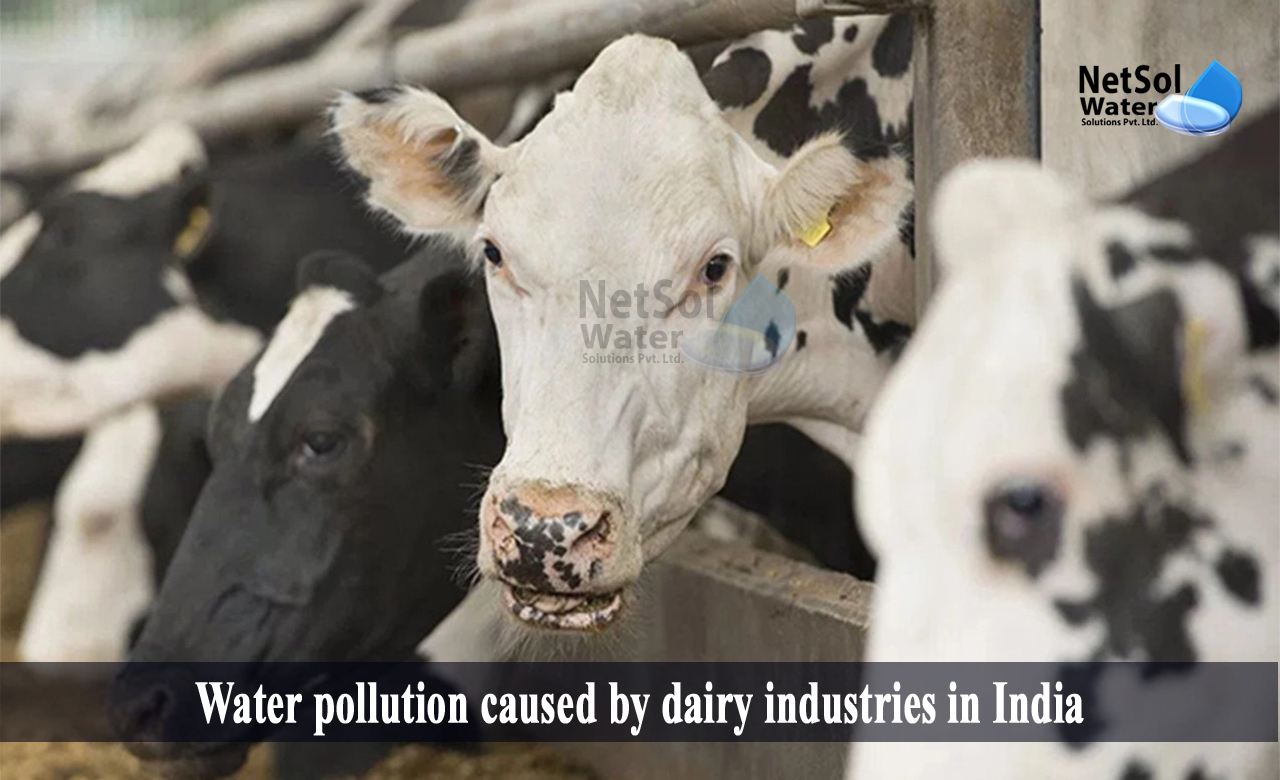Milk has long been regarded as one of the best sources of essential nutrients among all food products. Since 2000, the dairy industry has grown at a rate of about 4.2 percent per year due to rapid industrialization.
Water pollution is also on the rise as a result of this. According to The Hindu, approximately 2,700 dairy farms in Delhi have received notices for directly discharging wastewater, into river bodies. Worsening water quality combined with rising poverty could result in a major humanitarian crisis.
Let’s see the effect of water pollution caused by dairy industries in India and theireffective treatment.
How to Water pollution caused by dairy industries in India?
The dairy industry is the most significant water polluter, producing 2.5 to 3 litres of wastewater for every litre of milk processed.
Water is a valuable resource in milk processing plants, where it is used for a variety of tasks, such as cleaning, washing, disinfection, cooling, and heating. The wastewater released is a result of leaks, can overflows, and products such as, whey. As a result, it generates a lot of BOD and COD.
Dairy Wastewater Characteristics
The dairy industry contributes to the production of large volumes of industrial wastewater, with a high organic load that is difficult to remove.
The wastewater produced by dairy industry is typically white or yellow. When compared to other food industry effluents, it has a high organic content, including high levels of carbohydrates and proteins. Organic compounds such as lactose, whey proteins, nutrients, and fats emit foul odours, causing distress during the degradation process.
Typically, the effluents have high COD, BOD, and TSS levels. Dairy effluent characteristics vary according to industrial scale, processing type, process parameters, type of operation, type of water discharged, and many other factors.
Because, of the enormous amount of organic load, dairy effluent remains one of the primary causes of water pollution, and one of the best sources of nutrients for bacteria, algae, and fungi.
Dairy Wastewater's Environmental Impact
Dairy effluents are to blame for the foul odour and turbidity in the water. The organic concentration in effluent becomes toxic to aquatic ecosystems.
Casein is one of the most common compounds emitted by the dairy industry. When exposed to degradation, it degrades into foul-smelling black waste. Aquatic organisms can even die as a result of this. This effluent can cause hormonal imbalances in marine life and humans.
Treatment Goals for Dairy Wastewater
The goals of treating dairy waste are to:
1. Lower the organic content of waste water.
2. Eliminate or reduce nutrients that may pollute receiving surface or groundwater, and
3. Get rid of or kill any potentially pathogenic microorganisms or parasites.
Different Methods to treat wastewater of dairy industries
· Lagoons or ponds
Dairy plants in rural areas with insufficient farmland for land application may be able to use, ponds or lagoons for cost-effective dairy wastewater treatment.
A pond or lagoon is typically a shallow basin designed for the treatment of dairy wastewater, without the use of extensive equipment and controls.
Different types of ponds used are:
Aerobic Ponds: Aerobic ponds are typically 0.5-2.0 meters deep, with the contents mechanically mixed and aerated to allow sunlight penetration and algae growth.
The algae use waste products from the bacteria involved in the biological breakdown of milk wastes, to produce oxygen. With an aeration period of 5 days at 20°C, BOD removal can reach 85%.
Anaerobic Ponds: Anaerobic ponds are typically used to pre-treat high protein and fat dairy wastes, or to stabilize settled solids.
To effectively reduce BOD in anaerobic effluent, an anaerobic process must be followed, allowing anaerobic microorganisms to consume the residual breakdown products. The average retention time for anaerobic treatment ponds is 20 to 50 days.
Conclusion
The dairy industry has a large and negative impact on rivers and ecosystems. It also has a negative impact on human and animal communities, which rely on them for drinking water.
It is time for industries and organizations to take action and hold themselves accountable, for the waste produced at their facilities by evaluating cost-effective, sustainable, easily accessible, and entirely natural solutions, like ours.
How can we assist?
Netsol Water has aided in the resolution of hundreds of water-related problems, by utilizing a wide range of specialized water treatment and wastewater treatment technologies, in dairy industries of India.
Netsol Water is Greater Noida-based leading water & wastewater treatment plant manufacturer. We are industry's most demanding company based on client review and work quality. We are known as best commercial RO plant manufacturers, industrial RO plant manufacturer, sewage treatment plant manufacturer, Water Softener Plant Manufacturers and effluent treatment plant manufacturers. Apart from this 24x7 customer support is our USP. Call on +91-9650608473, or write us at enquiry@netsolwater.com for any support, inquiry or product-purchase related query.



